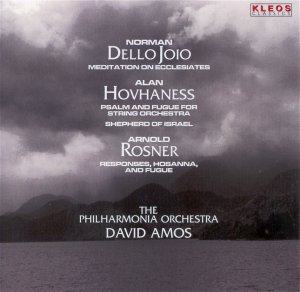This disc has passed this way before though under different
livery. It was first issued in the very early 1990s as part of a fascinating
three volume Modern Masters series. This was the second in the series.
The series did not last long in the catalogue and had been deleted after
a couple of years. Kleos have resuscitated the series in their resurrectionist
programme. I was able to review the original disc last year due to the
generosity of one of the composers featured here. Arnold Rosner had
a spare disc and after entreaties (mine, mark you!) let me have this
for review purposes even though at that time the disc was no longer
available. This was not an entirely futile exercise given the fascination
of the repertoire, the lively second user market, the quality of the
performances and the likelihood that eventually the disc would be reissued.
And so it has turned out though rather quicker than I had expected.
While many of my impressions are similar some works
have grown in esteem and others dwindled. The Dello Joio and the Rosner
retain their strengths as does the Hovhaness Sheperd of Israel.
However the nasal mid-West tenor of Sheldon Merel rather palls now I
here it again.
That said, the four works that are kith and kin in
their incantatory way. They also share a highly unfashionable allegiance
to richly ornamented string writing.
Dello Joio's Pulitzer award winning Meditations
is written in densely drenched harmonies twisted through a Bergian
spectrum. This is of such intensity that on occasion it tips over into
anguish. It is not music of Oriental inclination (not Hovhaness; not
Bloch) rather do we veer reflectively between Finzi, Barber and Shostakovich.
The Spumante movement revels in the same debonair joie-de-vivre
as Britten's Simple Symphony. However this is overwhelmingly
a work of inwardness and brooding. The effect is brilliantly carried
off by the Philharmonia aided by the open-minded engagement of David
Amos and the solo 'voices' of Hugh Bean (remember his Lark Ascending
with Boult) and the solo cello of David Jones.
The Hovhaness Psalm and Fugue is
less complex harmonically but more sustained and stylistically of a
piece than the Dello Joio. The performance is sturdy rather than incandescent.
Here speaks a composer utterly in thrall to tonality - at least until
he began to explore the wilder realms in Vishnu and Mountains
and Rivers Without End. Here the composer represents an exotic Vaughan
Williams branching out from Flos Campi via chant and descanting
melisma.
How good it is to hear Kenneth Smith's solo flute arabesquing
over the quadruple piano pizzicato of the violins in Shepherd
of Israel. Listen to his miraculous breath control in the Pastoral
[2.30] comparable to the sustained fall and rise of the words 'Sweet
Harmony' in Vaughan Williams' blissful Serenade to Music. Hovhaness's
trademark pizz are much in evidence and underscore the singing
of the cantor, Sheldon Merel. The conjuring of mood, line and tone are
perfectly handled by all concerned and it is no surprise that the trumpet
vies with voice as cantor in the final section - leading, reminding,
exhorting, imploring.
Rosner's Responses, Hosanna and Fugue
is deeply affecting and yet another discovery among the Rosner
output. Here he is close to RVW's Tallis though no mere epigone.
There are no obvious oriental paraphs. Light floods these pages with
high candle-power. Solo lines float effortlessly out of a stern textural
blanket and rhapsodically carry the argument forward. Karen Vaughan's
harp informs the proceedings but the starring role is that of the plenary
string 'church'. Rosner's music settles like a benison on our culture.
That such music was written in 1977 contra torrentum is proof
of Rosner's loyalty to his own voices rather than the transiently fashionable
claque. It is typical of Rosner that he ends with a light breath - no
gaudy peroration.
The recording is warmly bathed - suitable to the often
saturated string writing and yet has the transparency essential to the
crystal structures of the Rosner.
Rob Barnett


